

As useful as dental bridges and dentures can be, they can only replace the normally visible parts of your teeth; they do nothing about the roots that are needed to maintain a healthy jawbone. But with dental implants, our team at Legacy Dentistry has the ability to replace the entire tooth structure for a tooth replacement that looks and feels like the real thing. And, unlike other dental offices, there’s no need for a referral; you can have the surgery done right here in our familiar, comforting dental office. Call us today to learn more about the process of replacing teeth from the ground up with dental implants in Midlothian, TX.


Dental implants are very small posts normally made of titanium. Since they’re meant to function as tooth roots, they’re surgically inserted into the jawbone so that they can become part of the bone through a process called osseointegration. They can then support a prosthetic such as a crown, bridge, or denture. As long as your mouth is healthy and your jawbone is sufficiently strong, we can replace any number of teeth with implants.

In truth, the dental implant process spans several months. It thus involves a longer wait than dentures or bridges do. Still, keep in mind that implants’ benefits are worth this time and effort!
You see, Legacy Dentistry performs treatment in-office rather than with outside help. That way, our dentists’ expertise can make your implants look and feel stunning. In particular, there are four steps you should expect: consultation, surgery, osseointegration, and the final restoration. To learn more about them, keep reading or contact our office for details!

For the initial consultation, Dr. Nguyen or Dr. Desimone will review your oral health and medical history. Doing so will help them see if you’re a good candidate. After all, your mouth needs to be healthy for implant surgery to work. The prosthetics will fail early otherwise.
If our team finds prior dental issues, we’ll work with you on preliminary procedures. These might include gum disease therapy, tooth extractions, or even bone grafting. We can then plan the rest of your treatment — the cost, the step-by-step timeline, etc.

As already stated, we at Legacy Dentistry do implant surgery in our Midlothian office. This setup means you don’t need to travel far for an outside specialist. Furthermore, it lets our team have easy access to your dental records.
In itself, the surgery is fairly straightforward. First, our team will numb the affected area so it doesn’t feel pain. (This numbing could also include sedation if you’d like.) From there, we’ll make a small incision in the gums to make room for the implant. Once that’s done, we can place the post in your jawbone, close your gums, and put a protective cap over the restoration.

Following placement surgery, your implants will slowly fuse with your jawbone. This process, called osseointegration, takes 3-6 months —that means you need to be careful. If you aren’t, poor hygiene, bad oral habits, and other factors could ruin things and cause implant failure.
At some point during the implant fusion, you’ll return to our office for a minor abutment. More specifically, you’ll have a small surgery that connects tiny metal pieces to your new teeth. While you heal from that visit, the final restoration will be crafted from impressions of your mouth.

Last but not least, your treatment will end with a final dental visit that places your restoration. Given your needs, this prosthetic might be a crown, a bridge, or a denture. Regardless, though, we’ll then check to ensure your bite is comfortable. Afterward, you’ll be ready to enjoy your newly rebuilt smile!

Dental implants as we know them started becoming common in the 1980s, and today they’re more popular than ever, with 500,000 new posts being placed every year. We highly recommend dental implants to any patient that is missing at least one tooth, as they offer so many outstanding benefits that can enhance the quality of your life after tooth loss. If you’re not sure whether implants are right for you, take the time to learn a bit more about the benefits they offer.




You’re likely a candidate for dental implants if you’ve lost one or more teeth and have decent overall health. Each implant procedure is different and will be designed based on your unique needs.

As you might expect, you’ll only get one implant when a single tooth is missing. After your mouth heals from the placement surgery, the post will be topped with a carefully designed crown that can endure the forces of your chewing and completely fill in the empty space to prevent your other teeth from drifting.

Have you lost three or more teeth in a row? We may be able to replace them all with a dental bridge (a restoration made of two crowns and a few artificial teeth). Instead of making changes to your natural teeth, like with a traditional bridge, the crowns will use a pair of implants for support.

Even if you’ve lost an entire row, implants can still be a viable solution. Anchoring dentures to four or more implant posts keeps them firmly in place and allows you to chew tougher foods you might have trouble with otherwise. Also, since the implants stop the jawbone from breaking down, there’s less risk that your dentures will need to be frequently adjusted.
Learn More About Dental Implants

Patients that lost their teeth a while ago normally have less healthy jawbone available to support implants. But with mini dental implants, which as you might expect are about half the size of regular ones, more people have the opportunity to enjoy new teeth supported by sturdy artificial roots.
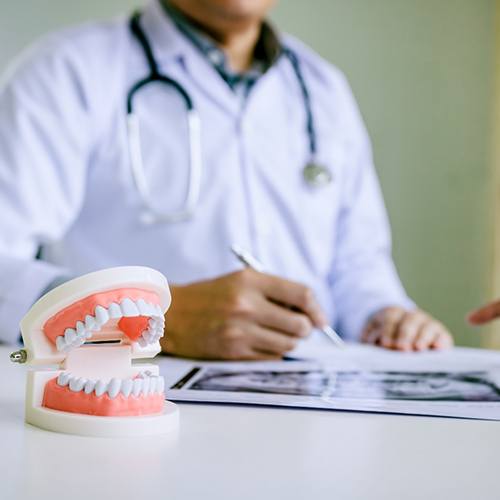
At Legacy Dentistry, we tailor our dental implant treatments to fit every patient’s specific dental needs. For this reason, it’ll be impossible to provide an exact price estimate of your procedure without performing an initial consultation and oral examination. By visiting us, we can assess your mouth, discuss your smile goals, and determine the best way to rebuild your missing pearly whites. Once we’ve had a chance to see you, we can walk you through the overall cost of dental implants in Midlothian. Until then, here are several important factors to consider about the treatment.
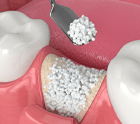
For dental implants to work, your oral health will need to be free of any issues that can compromise the success of the procedure. That’s why our team will examine your smile to determine if you’ll require preliminary treatments before going forward with the process. These services may include gum disease, tooth extractions, or bone grafting, which may increase the overall cost of your procedure. Most of these preliminary services are partially covered by dental insurance. Additionally, we can perform the entire dental implant surgery in-office. This means you won’t have to worry about having to pay an outside provider for your procedure.
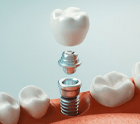
Here are several factors that can influence the overall price of dental implants:

While traditional restorations like dental bridges and dentures may seem more cost-effective initially, you’ll want to consider the overall price in the long run. Even though they may fit your budget now, having to adjust or replace them every several years can increase the cost over time. Since dental implants will serve as your new permanent roots and provide superior stability for your restorations, you won’t have to pay as much to maintain your brand-new smile. Furthermore, you’ll only need to practice good oral hygiene and schedule regular dental visits to preserve your them.

The majority of dental insurance providers won’t cover your dental implants. That said, there may be some exceptions depending on the parts of your treatment. For instance, certain components of your final restoration and any preparatory procedures may be eligible for coverage. Be sure to consult your insurance company about the details of your plan before committing to anything. You can even speak with our knowledgeable team if you need help navigating your policy and maximizing your benefits!

Even if you don’t currently have dental insurance, it doesn’t you’ll have to automatically empty your wallet. Our team is happy to provide a few alternative financing options that can best fit your budget. We have special offers for single dental implant placement, allowing you to save $500 as well as finance your treatment with as low as $299 per month. You can also sign up for our Legacy Dentistry Dental Savings Plan, which can give you discounts on multiple services, including implants. To save even more, we’re partnered with third-party financiers like CareCredit, LendingClub, and Green Sky to help break up the overall cost of your treatment into monthly installments with little to no interest.
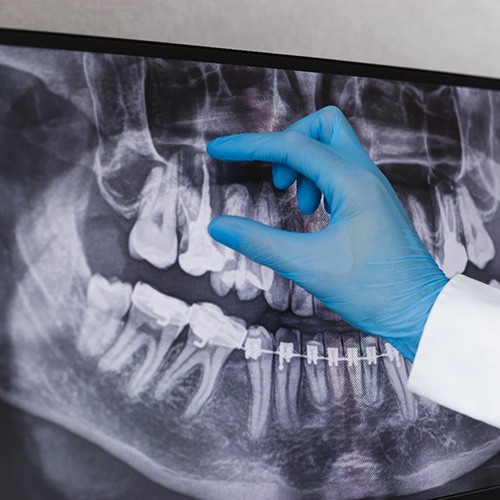
State-of-the-art technology is necessary for successful dental implant treatment. Because each implant has to be inserted in just the right spot in the jaw, precision matters. Otherwise, failed osseointegration could occur which can increase the risk of complications. At Legacy Dentistry, we take advantage of the latest advancements in dentistry to give you the best chances of success. If you’d like to learn more about our technology, click on the button below.
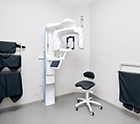
A cone beam computed tomography (CBCT) scanner has revolutionized dental implant treatment by providing precise and comprehensive diagnostic information. This advanced imaging technique uses a cone-shaped X-ray beam to capture detailed 3D images of the oral structures, including the teeth, jaws, and surrounding tissues.
By offering a comprehensive view of your anatomy, 3D cone-beam imaging allows us to accurately assess bone quality, identify vital structures, and plan implant placement with greater precision. This technology not only enhances the success and longevity of dental implants, but also minimizes the risk of complications.
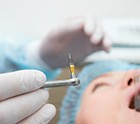
Using a surgical guide, we can enhance the precision and predictability of implant placement. The process involves the use of computer-aided design and manufacturing (CAD/CAM) technology and 3D imaging to create a personalized surgical guide.
This guide acts as a template during implant surgery, ensuring precise positioning of the dental implant based on the treatment plan. Guided dental implant surgery offers numerous benefits, including reduced surgical time, minimal invasiveness, unmatched implant stability, and enhanced aesthetic outcomes. It allows us to achieve optimal implant placement, resulting in higher success rates!
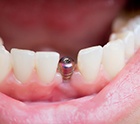
Peri-implantitis is one of the most common causes of dental implant failure. It’s an infection that occurs when harmful bacteria attack the tissues that support your implant, gradually weakening them. If left untreated, this issue can lead to the loosening or complete loss of your newly rebuilt smile.
Our team uses a specialized antibacterial coating to help reduce the risk of infection and protect your new teeth. It shields the implant and the surrounding area from bacteria that can trigger peri-implantitis. While it’s a simple measure, it goes a long way toward making sure the healing process after implant placement goes smoothly.
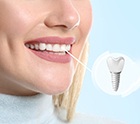
Dental implants are designed to support a custom-made restoration like a crown, bridge, or denture. Each of these is crafted out of high-quality dental porcelain, which ensures the results are as seamless as possible. A part of this process includes mapping the area to see where the restoration will go, ensuring it blends naturally with your remaining teeth.
Our digital impression system will quickly scan your teeth without touching them and create a detailed model of your bite. The digital layout it produces will be used to ensure your new custom restoration looks as natural as possible.
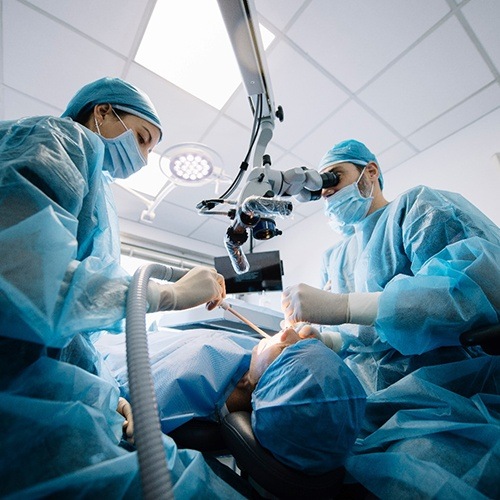
Although dental implants are an incredibly effective and long-lasting solution for rebuilding missing teeth, you’ll first need to be eligible for the procedure. This typically means you’ll require healthy gums and sufficient jawbone density to support your titanium posts. However, if your bone tissue isn’t currently reliable enough to ensure a successful dental implant treatment, then you might have to undergo certain procedures to get you ready. Here are some of the services our team can perform to prepare your mouth for your tooth replacements.
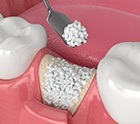
For your dental implants to work, they’ll need to undergo osseointegration with your jawbone tissue to become one with your facial structure. This process can take around three to six months to finish before you can attach your restorations, but it will require that you have enough density to offer a solid foundation.
If your jawbone is too weak to support the metal posts, then you’ll likely need a bone graft. This procedure involves using bone tissue from a donor or another part of your body and embedding it in the deteriorated area of the jaw to promote stronger bone. After several months, you should be fully recovered to move forward with the dental implant treatment.
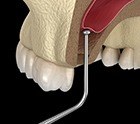
Whenever the upper jaw begins to deteriorate due to a lack of stimulation of blood flow, the sinus cavities can end up too close to where dental implants will have to be placed. If this is the case, we’ll need to perform a sinus lift to prepare you for your restoration treatment.
This procedure is a kind of bone grafting specifically aimed to address the issue. Your dentist will make an incision in the gums to access the bone. They’ll essentially push the thin membrane holding your sinuses out of the way before adding the grafting material to strengthen the jawbone. It should take around four to nine months before you’re ready for your dental implant placement.

Once you’ve undergone the dental implant placement process, we’ll want to ensure that you have a smooth and successful healing period. That’s where PRP/PRF treatment comes into play. Also referred to as Platelet-Rich Plasma (PRP) or Platelet-Rich Fibrin (PRF), this form of therapy helps patients recover faster while minimizing complications after their surgery. Our team will first extract a small amount of your blood before your procedure, and after using a centrifuge to prepare it, we’ll apply the PRP/PRF to the surgical site. This should promote better healing and reduce the risk of infections.
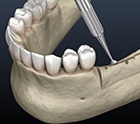
Sometimes a patient may not have a wide enough jaw to effectively accommodate dental implants. To make more room in your mouth, you might need to get a ridge expansion. Your dentist will make an incision in your gums to access the jaw. They’ll then divide the ridge bone and wedge the inner and outer segments apart. Bone grafting material will be used to fill the space between the sections before your gums are sutured to finish the procedure. After you’ve recovered properly, you’ll return to our office to continue your dental implant treatment.

Dental implant post-op instructions in Midlothian are essential for adequate healing. When surgery is complete, it is necessary that individuals follow these guidelines to avoid an infection, damage, or implant failure. It’s common to have many questions about what to expect during this 3–6-month recovery phase, which is why our team at Legacy Dentistry is here to provide greater clarity. Review the information below and call our office if you have any questions.

In the hours after your dental implant surgery, you need to make sure you get plenty of rest. Because it will take time for your anesthesia to wear off, you must have someone escort you home safely. It is also recommended that you take any prescribed medications or over-the-counter pain relievers before your anesthesia wears off. This will alleviate discomfort and keep you more comfortable as you rest. You should also avoid smoking or engaging in physical activity for at least 24 hours.

Although the actual procedure will cause no pain, you can expect some slight discomfort and soreness afterward. This can be remedied with OTC pain relievers as well as a cold compress. It is possible that you might see slight bruising and swelling, but these should dissipate within a few days.

A liquid diet is necessary for the days following your procedure, as you don’t want to apply unnecessary pressure to your dental implants in Midlothian. However, once you feel more comfortable, you can switch to a soft food diet that consists of:

Just because your jawbone is sore from receiving dental implants doesn’t mean you get a free pass on your oral hygiene routine. The day after surgery, you can begin to brush your teeth, but you’ll need to be mindful when nearing your surgical sites, as you don’t want to irritate them. You should follow this same rule for flossing.
While you may be tempted to use regular mouthwash, make sure it doesn’t contain alcohol. In fact, it is better to rinse with warm salt water to eliminate any bacteria inside the mouth. You can do this 2-3 times each day.

After months of recovery, you’ll finally receive your customized restoration. Once your implant dentist in Midlothian puts it into place, you shouldn’t experience any soreness; however, it is common to feel slight sensitivity. After a few days, though, this sensation should go away, allowing you to start enjoying your new and improved smile that can last 30 years or more!

As you might know, dental implants have the potential to last a lifetime. However, they’ll only do so if you give them proper care and maintenance. There’s a good chance they’ll fail or need replacement otherwise. Given these facts, then, we at Legacy Dentistry want to help your restored smile stay that way. As such, listed below are some tips on dental implant care in Midlothian. Please read them over to learn more about your prosthetics, or call our office for further details!.

Dental implants themselves can’t get cavities. (After all, they’re artificial.) Even so, you’ll still need to practice good oral hygiene for their sake. Various dental issues, especially gum disease, can cause implants to fail over time. Therefore, it’s crucial always to brush them twice daily, floss them once daily, and rinse them with mouthwash as needed. Doing so will ward off decay and infection that could ruin your restorations.

True enough, implants can handle tough foods; they let you eat most anything, really. That said, it’d be better if you held back on hard, sticky, or sugary items. A too-hard bite could still crack the prosthetics, and clinging sugar can cause decay that triggers implant failure. Instead, try to eat more “mouth-healthy” foods like lean proteins, leafy greens, whole grains, etc. Such products are jam-packed with nutrients that help your teeth, gums, and jaw stay strong.

Bad oral habits can and do make implants fail sometimes. For instance, tobacco products often keep the prosthetics from fusing with your jaw. Similarly, teeth-grinding, biting your fingernails, and chewing on pencils may cause your implants to break. You should thus stop these habits at once if you have them. That way, your new teeth will stay functional for many years to come.
To resist the behaviors above, try chewing sugar-free gum that keeps your mouth occupied. You could also consult with our office for other ideas.

Implants may be strong and durable, but they aren’t indestructible. You must take extra steps to protect them from injury and excess force. For instance, wear an athletic mouthguard for sporting events — it’ll protect your teeth from blows to the face. Getting a nightguard is also a good idea if you grind your pearly whites at night. The item would prevent extra wear and tear on your implants.

Even if you’re diligent at home dental care, there’ll still be leftover plaque. (Brushing and flossing can only reach so much of your mouth.) For that reason, remember to visit our dentists for regular dental checkups. Their oral exams will let them monitor the state of your implant(s). If they spot any issues, they can fix things quickly so you don’t need invasive dental work down the line

One reason why dental implants are so popular is because they have an impressive success rate of about 95% even 10 years after placement. Despite that, there are still rare instances of implant failure occurring. If your newly rebuilt smile feels like it’s in trouble, don’t hesitate to contact us for assistance! We offer dental implant salvage treatment to help restore your oral health.
Learn More About Dental Implant Failure and Salvage
Not all patients who receive dental implants are required to undergo a bone graft. However, if Dr. Nguyen believes your jawbone is too deteriorated, it may be necessary to have grafting minerals placed into various areas of your bone to create a more stable and structurally sound foundation for your implants. Although this additional procedure does require more time spent recovering at home, it is well worth it to receive dental implants that will remain in place for decades.
Much like any other type of procedure, there are always risks involved. Dental implant placement does have a high success rate, but there is a small chance that an infection could develop that requires additional treatment or surgery. It is also possible that nerves can be bruised, causing numbness throughout the lips, cheeks, and tongue. Should this happen, it will most likely be temporary.
Yes, it is possible for dental implants to fail; however, this is rare. Instances where an implant is incorrectly placed, or an infection develops within the bone can cause your procedure to be unsuccessful. This is why it is imperative that you select a trusted professional who has experience and training when it comes to surgically placing dental implants. Fortunately, Dr. Nguyen has advanced training in dental implant placement.
It is not uncommon for denture-wearers to inquire about switching to dental implants. During your consultation with Dr. Nguyen, he will examine your oral cavity and facial structure to determine if you are a qualified candidate. If the jawbone proves to be strong enough and you possess good gum health, there is a good possibility he can provide you with an implant-retained denture that contains between 4 and 6 implants.
When preparing for dental implant placement, Dr. Nguyen will administer anesthesia to ensure you remain pain-free throughout the procedure. Also, it may be possible to receive sedation dentistry to calm your nerves and make sure you are fully relaxed while he completes his work. Once the anesthesia and sedation wear off, you will likely experience mild to moderate discomfort and soreness. Fortunately, we can provide you with detailed instructions on ways to address your symptoms and start feeling better in no time.
I Need a Dental Checkup & Cleaning I am Looking for a Dentist for My Child I am Worried About Bleeding Gums I am in Pain or Had an Accident Dentists Make Me Anxious/Nervous/Afraid I Have a Cavity or Broken Tooth I am Missing One or More Teeth I Want to Improve My Smile I Want to Straighten My Smile View Our Services